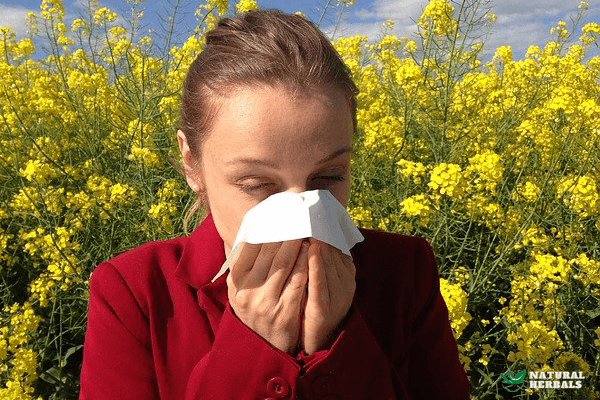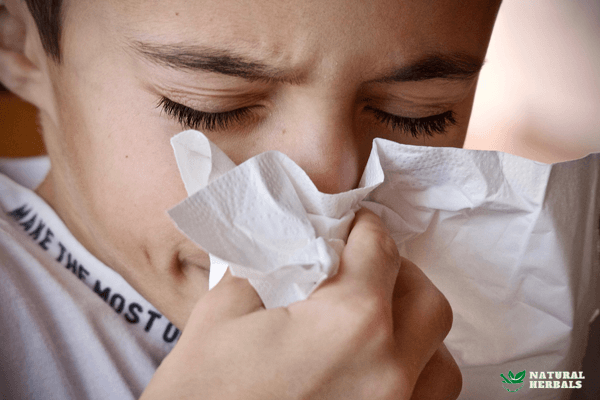
Hay fever is one of the symptoms of allergies. Treatment is based on various medications and desensitization, i.e. specific immunotherapy. Read what hay fever is, what its symptoms are and what the most common allergens are. Find out how to cure hay fever at home.
What is Hay Fever?
It is estimated that about 10 to 25% of people worldwide suffer from hay fever. These are mostly children and young people, usually under the age of 20, but the condition can also occur in older people.
Hay fever, also known as allergic rhinitis, allergic rhinitis or pollinosis, is an inflammatory condition of the mucous membrane of the nasal cavity and sinuses caused by an allergic reaction to inhalants – allergens. The body's inflammatory cells produce specific antibodies in the IgE class after contact with them, which are responsible for the development of symptoms typical of this disease.
Hay Fever Symptoms:
- Runny nose
- Sneezing, often occurring in series
- Itching and redness around the nose
- Occasional feeling of a blocked nose on both sides
- In addition, eye symptoms may co-occur: itching, redness of the conjunctiva, watering of the eyes, and swelling of the eyelids.
Allergic rhinitis is often accompanied by respiratory symptoms such as a cough, sore throat, hoarseness or a ticklish throat. Like hay fever, these symptoms are caused by allergens that come into contact with the mucous membranes of the throat or eyes.
Sometimes the symptoms of hay fever are less obvious. They may include impaired concentration that makes it difficult to work or study, a feeling of chronic fatigue, dry mouth, and snoring associated with nighttime wakefulness. Some patients also notice an elevated body temperature. In such cases, patients often confuse allergies with weakness, infections or the common cold.
Based on the duration of symptoms, hay fever is divided into: Intermittent – Lasting less than 4 days per week or less than 4 weeks total,
Chronic – lasting more than 4 days per week or exceeding 4 weeks in total.
What Allergens Cause Allergic Rhinitis?
- Pollen allergens (trees, shrubs, grasses or weeds)
- Mite allergens (house dust or storage mites, which are found in flour)
- Animal allergens, not only dander but also epithelium and secretions: saliva and urine of cats, dogs, horses, cattle, rabbits, guinea pigs, hamsters, rats or mice
- Allergens of fungi (moulds and yeasts)
- Other allergens (cockroaches, Ficus benjamini, latex, formaldehyde, soaps, detergents)
What Should You Know About Seasonal Rhinitis?
This type of allergic rhinitis is also referred to as seasonal, because it usually recurs every year in a specific month that corresponds to the flowering season of the allergenic plant. It may also be caused by mold spores, mainly Cladosporium (symptoms usually worsen when grasses are mowed) and Alternaria (their highest concentration occurs during the cereal mowing season).
Year-round Allergic Rhinitis – What Causes It?
House dust mites are most often blamed for year-round allergic rhinitis. Why does this happen? You are constantly in contact with allergens in your own home. However, this does not mean that the severity of your symptoms must be uniform throughout the year.
If you suffer from this type of allergy, the increased symptoms will become more pronounced once the heating season begins. Unfortunately, central heating (and cooling) increases air circulation, causing dust to invisibly circulate throughout your home and saturate the air you breathe in.
How to prevent hay fever caused by dust mites and dust? Clean! As often as you can! In a clean room the incidence of the allergen will simply be lower! Or you might want to consider an air purifier.
How do you tell the difference between a hay fever and a cold?
In the early stages of allergic rhinitis, it is sometimes difficult to distinguish it from a cold or runny nose. If you have a blocked nose (e.g. only on one side), no nasal or eye symptoms, purulent discharge, sinus pain, recurring nosebleeds and smell disturbances, it is probably not allergic rhinitis. In this case, consult your doctor immediately for further diagnosis and treatment.
Are you in doubt as to whether you have allergies or if it's just a common cold? A characteristic of allergic rhinitis, like other allergy symptoms, will be that they appear in certain situations – usually when there is contact with an allergen. Do your symptoms appear at the same time every year? It is very possible that you are allergic to the pollen plants that are present at that time. This is even more likely if your symptoms flare up when you are outdoors in nature.
Are you visiting friends who have pets and suddenly you start getting a runny nose? It could be an allergy to dander, or more specifically, proteins present in the saliva of some pets. It can be slightly more difficult to diagnose an allergy to house dust mites. They usually give less severe but long-lasting symptoms that occur virtually year-round.
When trying to determine what is causing your runny nose and whether you are dealing with allergies, the symptoms that accompany the runny nose itself and the situations in which it occurs are very important.
How do you recognize allergic rhinitis?
First of all, if the runny nose is an allergic reaction, it will be accompanied by other allergy symptoms. Sneezing and itchy nose may appear. You may also notice other symptoms, such as itchy and watery eyes and an allergic cough, which sometimes develops into allergic asthma. Hay fever may also be accompanied by skin allergies.
It is said that the most common form of allergic rhinitis is a watery nasal discharge. This is not at all the rule! Occasionally, an allergist may experience a blocked nose rather than a flowing, runny nose. Another symptom that occurs with allergies is an itchy and tickly throat.
This is all due to the contact of skin and mucous membranes with the allergen. The inhaled air, in which the allergenic particles float, enters the nose and throat, where it comes into contact with the mucous membranes. In a similar way, the allergen can cause itchy eyes, due to contact between the mucous membranes of the eyes and the agent responsible for the allergic reaction.
You can recognize allergic rhinitis by observing how your body reacts to the removal of a potential allergen. If after rinsing the nose with a saline solution or physiological concentration of sea water, the symptom significantly loses strength, there is a good chance that the runny nose was due to irritation from the allergen.
Dissolved in water and washed out allergens no longer cause an allergic reaction on the surface of the mucous membrane, and thus the runny nose and itching weaken. The situation will be different when the cause of the catarrh is an infection. Then, such a treatment will not improve the situation and the catarrh will immediately return.
Can the symptoms of allergic rhinoconjunctivitis be reduced?
Rhinoconjunctivitis as with any allergic disease, you must try to avoid allergens. Regular rinsing of the nose and rinsing of the eyes, e.g. with saline, may bring relief. Nasal decongestants containing xylomertazoline in the form of nasal drops or oral pseudoephedrine preparations available over the counter may also help, but should only be used for 3 to 5 days. Overuse of these can lead to an increase in nasal congestion.
Chronic use of xylometazoline or oxymetazoline-based nasal drops, which have a shrinking effect on small vessels in the nasal mucosa, can also lead to rebound rhinitis (overuse of the drops) and permanent damage to the mucosa. For this reason, preparations with sea salt solutions, glycocorticosteroids, or cromoglycans are much safer to use.
Nowadays, glucocorticosteroid drugs in the form of nasal sprays are the main weapons in the fight against allergic rhinitis. Recently, these preparations have been available at pharmacies without a prescription and can be used for allergic rhinitis. The effect of the substances contained in these medicines is to reduce inflammation and inhibit the allergic reaction in the nasal mucosa.
Antihistamines are also effective in reducing allergy symptoms. You can get them at the pharmacy in the form of tablets or syrups. They have a systemic effect and reduce allergic reactions. Older antihistamines may cause sleepiness and impaired concentration, so when you use them, it is best to avoid driving and take them at night. Newer generation medications no longer have this side effect and can be taken during the day.
You will also get other allergy suppressants in the form of eye drops or nasal sprays at the pharmacy. The active substances in this case are either sodium cromoglycate or azelastine.
In cases of more severe symptoms, it will be necessary to see a doctor to properly diagnose, identify the causative agent and implement appropriate treatment.
Treating Rhinitis
Pharmaceutical Hay Fever Treatment
Treatment for a chronic runny nose that does not respond to home remedies must be planned by your doctor. The allergologist will check what allergen is causing your rhinitis and then recommend the appropriate treatment.
The most effective treatments for hay fever include:
1. Intranasal glucocorticosteroids
They reduce the allergic reaction that occurs in the nasal mucosa. Use them regularly, but as directed by your doctor. Do not be afraid of long-term treatment. Modern preparations act at the site of administration and are absorbed into the blood to a negligible extent, so they do not cause side effects. Today, intranasal corticosteroids are the mainstay of treatment for allergic rhinitis. They have been available in pharmacies without a prescription for some time.
Allergy nasal drops may also be formulated with cromoglycans. These ingredients have anti-allergic and anti-anaphylactic effects. They inhibit the allergic reaction. In addition, they seal small blood vessels and stop the migration of cells associated with inflammation.
2. Antihistamines
Antihistamines reduce the release of histamine, the protein responsible for swollen mucous membranes and a blocked nose. Antihistamines can be taken as tablets or nasal drops. Newer generation medications do not have the unwanted effect of drowsiness, so they can be used throughout the day.
3. Specific immunotherapy (desensitization)
This method involves administering small, gradually increasing doses of the allergen responsible for the symptoms over a period of 3-5 years (usually by subcutaneous or sublingual injection).
Studies have shown that desensitization helps with allergies to grass, tree and weed pollen, Alternaria and Cladosporium mold spores and house dust mites, among others. In most patients, immunotherapy reduces hay fever symptoms and the need for medication and may prevent the development of bronchial asthma.
Prevention and Natural Home Remedies For Hay Fever
If you are wondering how to cure hay fever with home remedies, here are some simple tips.
1. Perform a diagnostic and avoid the allergen
Since allergic rhinitis is the result of mucous membrane contact with an allergen, to reduce it, it is best to limit this contact as much as possible. To do this, conduct a thorough diagnostic to find out what exactly is causing the sensitization. Depending on the sensitizing agent, you can act to reduce your exposure to it. You can perform allergy tests that will give you a clear answer.
2. Clean up your house
If you are allergic to house dust mites, give your home a makeover. Reduce the equipment, materials and trinkets that collect it. You can also find special cleaning products for allergy sufferers on the market that neutralize dust mites. They are easy and safe to use. They come in the form of aerosols for use on beds and mattresses as well as bedding or upholstery.
You can also use them on plush toys or carpets. These preparations reduce symptoms of allergies caused by house dust mites, including coughing, allergic rhinitis and allergic conjunctivitis.
3. Filter the air in your home
Another way to combat house dust mites is with the right air purifiers and filters to reduce their concentration in the air circulating in your home.
4. Keep an eye on the pollen calendar
If you discover that your hay fever is triggered by specific plant pollens, you too can implement a few courses of action that will improve your comfort and reduce your hay fever. Find out in which months the plant you are allergic to is pollen.
During this time, limit outdoor activities and the ventilation of your home. Pay attention to where the sensitizing species occur and if you plan to vacation during this time, choose a place to avoid contact with pollen.
5. Nasal, eye and throat rinsing
Home remedies for hay fever caused by airborne allergens that enter the nose and trigger an allergic reaction also include regular rinsing of the nose, throat and eyes. Allergenic particles, once dissolved in water and removed from the mucous membrane, cease to have an effect. Therefore, a mundane nasal rinse with, for example, saline solution or sea salt spray can significantly reduce hay fever symptoms.
You can do the same with your throat and eyes, where allergens can also settle and cause coughing, tearing or runny nose. Remember to rinse your eyes with solutions intended for this purpose. You can use a saline ampoule for this purpose.
6. Sinus rinsing
Home remedies for allergic rhinitis also include sinus rinsing. For this you can use different concentrations of saline and special bottles that make it easier to push the solution into the sinuses. In the case of allergic rhinitis, solutions of physiological concentration are sufficient. These will effectively flush out allergens.
For mild to moderate allergic rhinitis, home remedies may suffice. If your symptoms are more intense, however, you can't do without preparations from the drugstore. It is also advisable to visit an allergologist to find out what you are really allergic to.
Herbal Treatments For Hay Fever
Pink Butterbur
There is evidence showing that Pink butterbur may reduce allergic reactions and help alleviate some of the symptoms associated.
Milk thistle
Some research shows that taking milk thistle extract by mouth along with the allergy medication cetirizine (Zyrtec) reduces seasonal allergies more than taking cetirizine alone.

I am an official member of International Association of Therapists and research natural healing methods and herbs. The posts are my findings.


